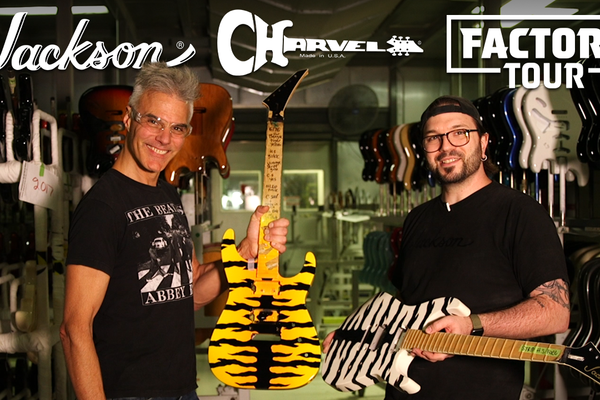In a great performance, head space trumps fancy fretwork, but finding that magic zone means sidestepping your lizard brain.
Is fretboard mastery more about mind control than digital dexterity?
If you're a performing guitarist, life will sometimes throw you a curve ball. To make it in the majors, you have to be able to hit whatever comes down the pipe. Here's a true story of a recent curve ball that left me drenched in sweat and feeling like my heart was going to explode.
I'm typing this in my hotel room a few hours after having played on The Voice. My adrenaline-fueled fingers are beating my keyboard like it owes me money. With my heart still racing, I'm trying to record the experience while the details remain fresh. Live TV happens fast—you literally have about 25 seconds to run onstage, plug into unfamiliar gear, tune, check your tone, and then play when you get the cue. To avoid an on-air melt down, I try to keep my setup simple. But this song required an Edge-like tone that incorporated amp reverb and two delays—one set for quarter-notes and the other for dotted eighths.
During our hurried rehearsal, I plugged my steel guitar into a volume pedal, two delay pedals, and the supplied backline Fender Vibroverb. I hit a note and heard only crackling from the amp. I quickly began the standard troubleshooting routine: I tried both channels, swapped out cables and pedals (I'd brought a spare delay), and tried different power. I even smacked the amp hard while cursing under my breath.
Eventually, I jettisoned the quarter-note delay and landed on a single delay pedal that worked. As Murphy would have it, the amp's reverb was broken as well. It was the performance equivalent of driving across country in a car with three cylinders firing—not ideal, but it should get you there. We ran the song twice in rehearsal, my rig worked on the second run through. I felt like I'd dodged a bullet.
Come show time, they rolled out our gear during the commercial break. I took my place, picked a note, and heard nothing but an ominous crackle. As the stage manager dramatically counted down from 20, I unplugged everything but my volume pedal and went straight into the amp. Suddenly my signal was back, louder than rehearsal and dryer than the Mojave. Because the part I planned on playing was based on the delays hitting three notes for every one I played, I had to improvise to cover some of the space. If you watch the performance, you'll see me turning around during the opening shot as I try one last time to get the amp's reverb to work. No go. Although I missed hearing all the sweet ear candy I'd planned, my somewhat underwhelming part worked. Not a home run, but I hit the curve and made it on base.
Fast-forward two weeks: I'm more relaxed and not fighting off a stress-induced psychotic breakdown. The Voice snafu reminded me of something in Super Brain, a book by Deepak Chopra and Rudolph E. Tanzi. It explains that when we panic, our “reptilian brain" (the amygdala and other bits of the limbic system) throws a mutiny, takes control, and releases a chemical called glutamate that makes you either freeze or involuntarily jump. I don't think I jumped when my gear didn't work, but I did spend a few seconds staring blankly into space until a hot hit of adrenaline sent my heart and blood pressure soaring in preparation for flight or fight. Neither option would have helped me much on that gig.
Super Brain maintains there's a constant battle between our limbic system and our more advanced brain. Luckily, we are not our brains. If you're doing it right, your mind is in control making your brain your bitch. The challenge is that the sound of rational thought is often quieter than the crazy voice of fear in your head combined with the rush of stress-triggered chemicals flooding your body.
This may sound new-agey, but I've been trying to be more aware of how my brain and body react in my normal day—particularly when I'm playing guitar. Here's what my newfound attempt at self-awareness reveals: Even though I record often, I notice my heart races a bit for the first few clicks of a session nearly every time a red light comes on. Also, when I play in front of an audience, be it one person or thousands, I feel my body tense up and I quit breathing when I have to play something difficult. A little nervous tension isn't unexpected in these scenarios, but something else surprised me.
If I'm alone with nothing to do at the end of the workday, I'll often grab my guitar and play for fun with my metronome as my dog lies in the yard. For me, it's the most tranquil setting imaginable. Here in my calming Fortress of Solitude with absolutely no reason to be nervous, I've noticed I still quit breathing and tense my shoulders when I try to play something difficult. As a test, I recorded my mindless porch-dog-metronome jam. Playback revealed I rushed during the challenging parts, as if adrenaline was commanding my fingers to flee. I began to concentrate on taking slow, deep breaths through my nose as I played, rather than thinking about what my fingers should be doing.
By focusing on breathing, my mind can stay in control and my fingers will do what they've been trained to do. At least that's what I'm working toward. Right now, I still catch myself holding my breath during finger acrobatics.
Hitting the curve is about remaining calm and in control, so your body can do what you've trained it to do. The benefits of this can go way beyond improving your musicianship. Try to become aware of situations that trigger your lizard brain, like when you're stuck in traffic, having a disagreement, or just feeling annoyed at people. Breathe deep—you've got this.



